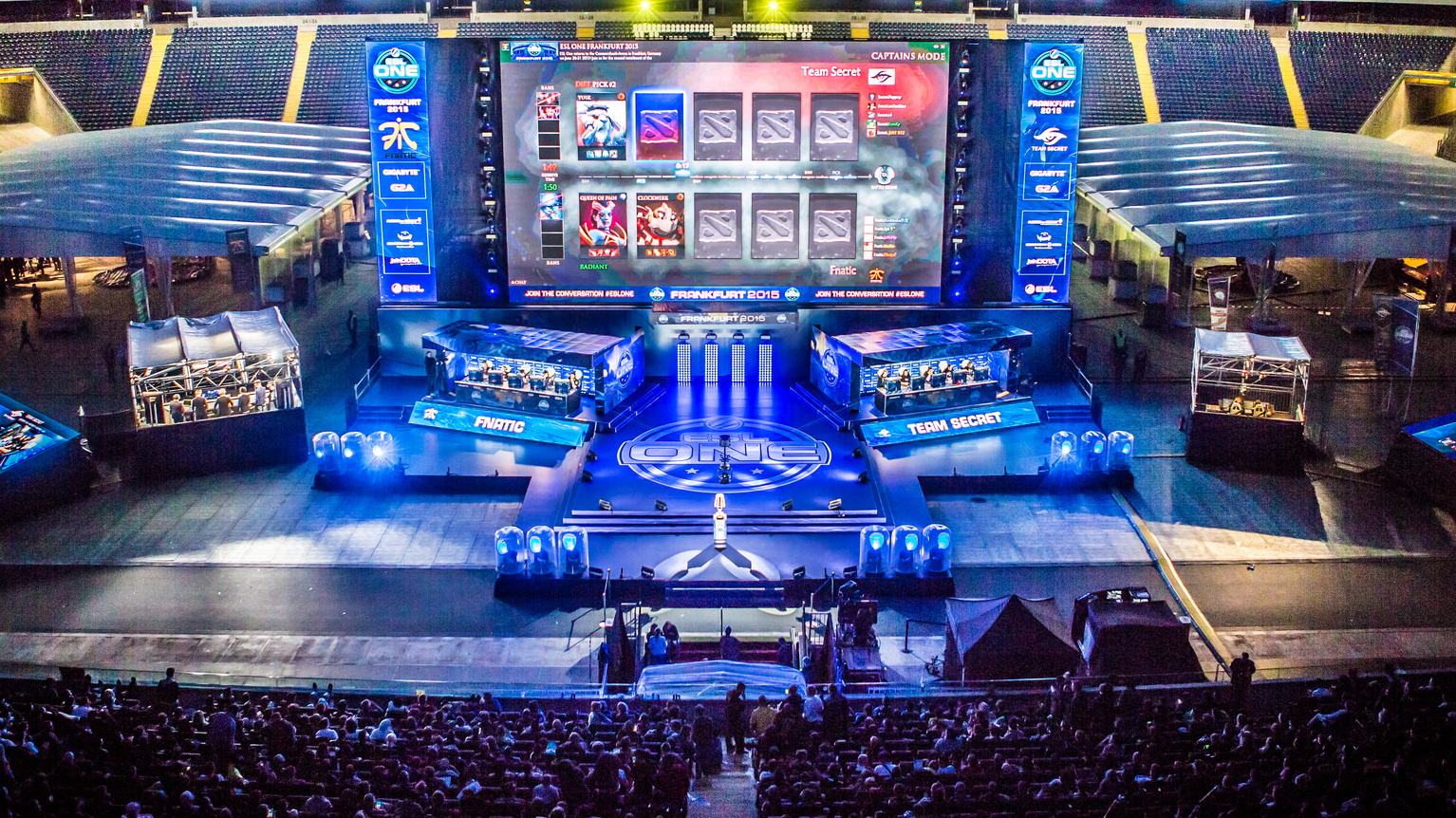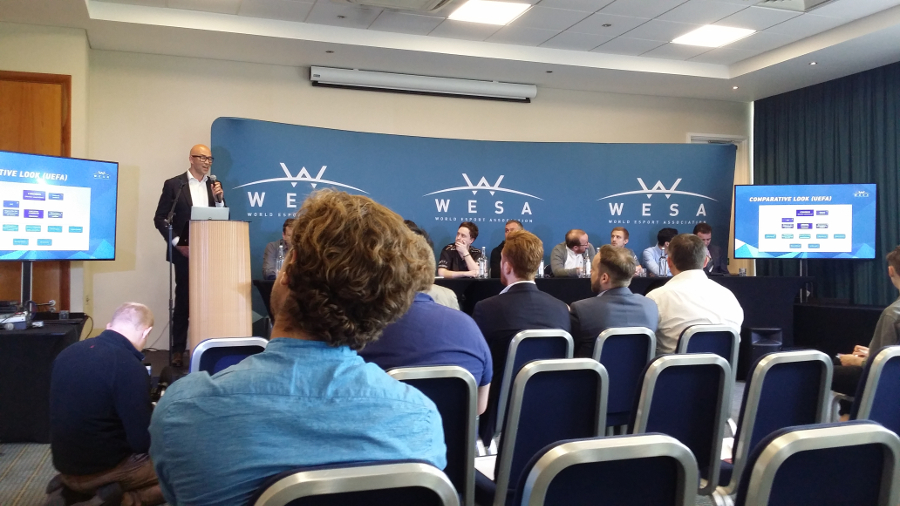The beautiful aim: can WESA fix eSports?
It's a big ask

ESports has turned into the rebel of the entertainment world in recent years, skulking around like a moody teenager tanked up on Mountain Dew. The scene is becoming infamous for players breaking their contracts, taking performance-enhancing drugs and generally testing their sponsors' patience. And they're the well-behaved ones.
Those controlling the industry from behind closed doors aren't much better: increasingly demanding fixture schedules, tournaments being blighted by technical issues and cases of player mismanagement have long become the norm.
Formed in a bid to restore order to the chaos, the World eSports Association (or WESA)'s arrival doesn't feel before time. The self-appointed governing body won't host leagues or tournaments itself but instead plans to apply a framework based on "fairness, transparency and integrity" to sanction and support the growth of existing ones around the world. In short: it seeks to raise the profile of eSports while giving everybody involved a helping hand along the way.
It should be noted that we were told WESA is a different thing to the eSports "integrity initiative" we were recently told about, a coalition that was being planned to regulate problems of doping, cheating and match-fixing in eSports. However, it shares many of the same goals.
Asking questions
The problem held up by WESA's detractors is that the group has been founded by the ESL (Electronic Sports League), the biggest eSports organisation out there. As such, skeptics have called into question WESA's impartiality and claim that the ESL is out to favor its own teams and leagues. Ralf Reichert, CEO at WESA, says that such skepticism is to be expected.
"It's part of our culture and everybody has the right to question what's going to bring success - and that's OK," he says. "This is the start of a journey, and ours is to prove that what we're trying to achieve can be done.
"We've been humbled by the amount of feedback, which shows that it's certainly a sticky topic, but I won't dismiss criticism - I'll take it as something that means we have a lot to prove."
Get daily insight, inspiration and deals in your inbox
Sign up for breaking news, reviews, opinion, top tech deals, and more.
The issues of accountability and transparency are pertinent ones following the downfall of corrupt FIFA officials in 2015, and comparisons with the global footballing body are inevitable. But where FIFA places itself at the top of a multi-country model, WESA takes a hybrid approach that aims to share power between a triumvirate of leagues, players and teams. Reichert calls it "FIFA 2.0".
"FIFA is not a bad model, minus the corruption," he says. "WESA is different because the body, leagues and players are supposed to balance out. If non-WESA teams are getting a clear disadvantage then we'll be challenging that."
Billed as an inclusive organization open to all, WESA initially launched with eight eSports giants as founder members - including Fnatic, Team EnVyUs, Natus Vincere and Ninjas in Pyjamas. Reichert won't say what reasons other teams have given for not immediately signing on the dotted line, but he insists that convincing them is "one of our biggest challenges".

Getting more teams onboard isn't just crucial to expanding the legitimacy of WESA, it's vital for the body to clean up one of the industry's most tangled of webs: disputes.
Barely a week goes by when the ban hammer isn't wielded. In May 2016 alone team YouPorn was banned by ESL for being sponsored by an adult entertainment site, while League of Legends creator Riot Games removed teams Renegades and TDK from certain leagues over sanction violations, concerns over player welfare and deliberate misrepresentations of professional relationships. At the time of writing, appeals by each of the above teams appear to have fallen on deaf ears.
For the first time, WESA plans to use a specialised, external arbitration court for eSports with the power to settle disputes in hours or days, rather than weeks or months down the line. Designed to be more than a mere deterrent, they will feature lawyers that decide on cases and any verdicts will be enforceable in front of a regular court.
According to WESA's interim League Commissioner Pietro Fringuelli, who has worked at sporting organisations including the German Bundesliga, players breaking their contracts to switch teams is one of the most common disputes.
"It makes so much more sense for disputes to go to arbitration, but the process relies on people being in WESA," Fringuelli says. "Otherwise we have a headache."
He adds: "Arbitration is a much preferred option because once a dispute becomes public it's much more expensive and trials can last a year, and then appeals have to be fought. Moreover, all of that can be incredibly damaging for a player's personal image."
Fringuelli is confident that WESA could be particularly effective at solving disputes that take place at tournaments abroad and involve players whose owners are located in different countries. "Who pays for the lawyers then?" he asks rhetorically, shrugging.
WESA aims to make the arbitration process more attractive to overseas teams with another first: electronic arbitration carried out over Skype. "Why aren't arbitration courts around the world doing that? I don't know," muses Fringuelli. "Maybe the guys running them are 60 years old or something."
According to Fringuelli, swiftly resolving disputes will help lift the outside perception of eSports and as a result attract even more revenue to the industry by attracting "big-name sponsors".
"When you are not giving the sponsor the idea that everything is safe in this world, they will fear what happens if something goes wrong tomorrow," he adds.
Sharing the wealth
It seems unlikely that the mega-sponsors Fringuelli alludes to aren't already interested in eSports on some level. Despite its problems, the industry is predicted to rake in $1.1 billion by 2019 while being watched by 427 million people globally, according to market watcher Newzoo.
WESA has promised to share profits among its teams in a fairer manner than what has gone before, providing another incentive for teams to join. The ESL Pro League for Counter-Strike: Global Offensive, which will be the first professional sports competition played under WESA regulations, continues to pay out bigger prize pools each year with $1.5 million on the line for the 24 competing teams in 2016.
According to Team EnVyUs managing director Mike Rufail, WESA's approach is good news for teams who aren't quite reaching the top tier of success.
" Prize money increases in Counter-Strike have been substantial this year and this is a great source of revenue for players who are successful, but what about the contenders or up and comers who aren't reaching the podium?" he wrote on the team's blog. "It's much less a factor for them."
Rufail added: "The players will now have a additional sources of revenue coming to them that they have never had access to. In addition, the organizations they play for will also which will certainly trickle down to the players further as they negotiate their contracts based on how well the teams are doing financially. WESA is the first to offer this."
Fringuelli is optimistic that having a more equal system of sharing revenue among teams will help foster competition, as it will give a greater number of teams a better chance of buying higher-skilled and more expensive players.
"Bayern Munich always win the Bundesliga, and it's boring," he says. "We need distribution metrics that are equilibrated when it comes to revenue share, not ones that see teams that have best negotiated with tournament organizers get most of the money.
"At the end of the day there's more competition between the teams which makes leagues more exciting for everybody."
Deadly diary
Scheduling is another problem that has proved a thorn in players' sides. With a cacophony of leagues, tournaments and matches taking place throughout the calendar year, top-tier professionals are stretched to the limit. That's according to Wiktor "TaZ" Wojtas, who says that hectic fixture schedules have been a problem for a long time.
"With or without WESA something had to change," he says. "There's been too many tournaments, and players can't get enough practice so can't bring their A-game every time. They need to relax and spend time with their family too."

Wojtas says that scheduling should take note from European football leagues to keep fans interested and engaged.
"When El Classico is on, the whole football world stops," he says. "But when it comes to Counter-Strike all of the top matches happen too often to build hype. People don't really know how important top matches are, and if fewer games were played then they would be more important and fun to watch."
WESA's CEO is hopeful that the organisation can emulate broadcasters in planning ahead when drawing up fixture schedules.
"If you look at the traditional broadcasters, they plan ahead six to 24 months in advance," Reichert says. "We hope that the involvement of the top teams that are part of WESA incentivises everyone to be more careful around scheduling and improve it. This issue has been hindering the growth of sports and it's important to figure out a solution."
Player representation
Perhaps the most enticing incentive for players (aside from being paid more fairly and having to work less) is the opportunity to get their voices heard. With the numerous issues that need to be tackled within the industry, WESA has recognised that player power could be a huge incentive for teams thinking of joining the organisation.
WESA has set up a player-elected council called the Player Council, in which teams can nominate a player to help guide decisions on league policy, rulesets, player transfers and more.
"I think the players have always had good communications with tournament organizers, but the council just gives us a more comfortable way to discuss problems," says Wojtas. "We can put pressure towards WESA and the different leagues to get our voices heard in a more professional way."
It's process that's appealing to team owners too. Wouter Sleijffers, CEO of Fnatic, says that player representation has been a long time coming in the industry.
"Fnatic started in 2004, and like many organisations part of WESA we were players ourselves," he says. "Many organisations started playing out a passion for games and started in teams or groups and got bigger. Even though I've retired, I still love sports and what we're built up. We wanted to give our players a direct voice and participating in WESA lets us do that."
The future of WESA ultimately comes down to its ability to convince more teams and leagues to join. The democratization of eSports and everything that takes place within it is something that the industry has needed for some time, but whether the industry's main players are happy for it to be orchestrated on what is ultimately ESL's terms remains to be seen.
